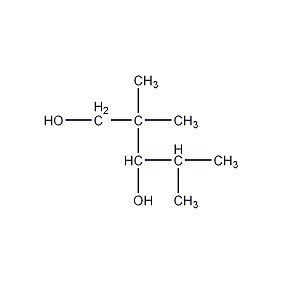2,2,4-Trimethyl-1,3-pentanediol

Structural formula
| Business number | 03WC |
|---|---|
| Molecular formula | C8H18O2 |
| Molecular weight | 146.23 |
| label |
Trimethylpentanediol, 1,3-Dihydroxy-2,2,4-trimethyl pentane, 2,2,4-Trimethylpentane-1,3-diol, paint solvents, Solvents for printing inks, fungicides, paint mixer, paper sizing agent, Cross-linking agent |
Numbering system
CAS number:144-19-4
MDL number:MFCD00004681
EINECS number:205-619-1
RTECS number:SA1400000
BRN number:1698098
PubChem number:24859650
Physical property data
1. Properties: white crystalline solid
2. Density (g/mL): 0.897
3. Melting point (ºC): 52
4 . Boiling point (ºC, 101.3kPa): 234
5. Flash point (ºC, open cup): 113
6. Viscosity (mPa·s, 50ºC): 27
p>
7. Refractive index (15ºC): 1.4513
8. Solubility: Soluble in most alcohols, glycols, aromatic hydrocarbons and ketones, slightly soluble in water and aliphatic hydrocarbons.
9. Refractive index at room temperature (n20): 1.451315
Toxicological data
1. Acute toxicity: Rat oral LD50: 2500 mg/kg;
Rat intraperitoneal LD50: 800 mg/kg;
Rat intravenous LD50: 145 mg /kg;
Mouse oral LD50: 2200 mg/kg;
Mouse abdominal LD50: 800 mg/kg;
Mouse intravenous LD50: 145 mg/kg;
Rabbit transdermal LD50: 6300 uL/kg.
2. It has no obvious irritating effect on human skin. TMPD is easily excreted in urine when inhaled.
Ecological data
This substance may be harmful to the environment, and special attention should be paid to water bodies.
Molecular structure data
1. Molar refractive index: 42.06
2. Molar volume (cm3/mol): 156.4
3. Isotonic specific volume (90.2K ): 373.7
4. Surface tension (dyne/cm): 32.6
5. Polarizability (10-24cm3): 16.67
Compute chemical data
1. Reference value for hydrophobic parameter calculation (XlogP): 1.4
2. Number of hydrogen bond donors: 2
3. Number of hydrogen bond acceptors: 2
4. Number of rotatable chemical bonds: 3
5. Number of tautomers: none
6. Topological molecule polar surface area 40.5
7. Number of heavy atoms: 10
8. Surface charge: 0
9. Complexity: 97.4
10. Number of isotope atoms: 0
11. Determine the number of atomic stereocenters: 0
12. Uncertain atomic stereocenter Number of stereocenters: 1
13. Determined number of stereocenters of chemical bonds: 0
14. Uncertain number of stereocenters of chemical bonds: 0
15. Total Number of price key units: 1
Properties and stability
Stable under normal temperature and pressure. Participates in reactions typical of common diols to form a variety of compounds. Reacts with various carboxylic acids or dibasic acids to form monoesters, diesters or polyesters.
Incompatible materials: strong oxidizing agents
Storage method
Store sealed in a dry and cool place.
Synthesis method
It is formed by hydrogenating the trimer of isobutyraldehyde.
![]()
Purpose
1. Mainly used in the manufacture of polyester resins and alkyd resins for coatings. It is also used to synthesize ester products and as plasticizers in coatings and plastics. Solvent for coatings and printing inks.
2. The unsaturated polyester made of this product has low relative density, low viscosity, small heat release during curing, and excellent electrical insulation properties. It has good water resistance, heat resistance and chemical resistance, and has good adhesion to glass fiber or other fillers. It can be used to make storage tanks and pipelines to load hot concentrated acids, certain solvents, weak alkalis, and secondary Chlorate solution and concentrated ammonia. It can also be used to prepare coatings, plasticizers, polyurethane resin elastomers, sound insulation panels and adhesives for glass cloth laminates. It can also be used as a fungicide, pigment leveler, paper sizing agent and cross-linking agent for PVC adhesives
